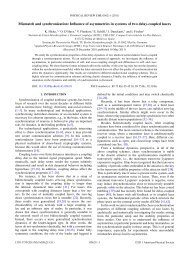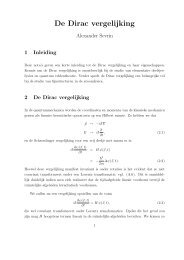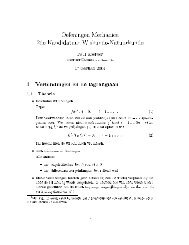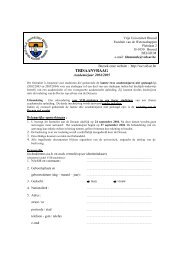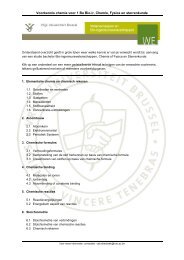DBI Analysis of Open String Bound States on Non-compact D-branes
DBI Analysis of Open String Bound States on Non-compact D-branes
DBI Analysis of Open String Bound States on Non-compact D-branes
Create successful ePaper yourself
Turn your PDF publications into a flip-book with our unique Google optimized e-Paper software.
CHAPTER 7. A FIRST EXAMPLE 897.1.4 Perturbed equati<strong>on</strong>s <str<strong>on</strong>g>of</str<strong>on</strong>g> moti<strong>on</strong>We proceed to computing the equati<strong>on</strong>s <str<strong>on</strong>g>of</str<strong>on</strong>g> moti<strong>on</strong> for the perturbati<strong>on</strong> δτ:∂L0 = ∂ µ∂ (∂ µ δτ) = ∂ ∂Lt∂ (∂ t δτ) + ∂ ∂Lr∂ (∂ r δτ)⎡ √ ⎤ [= ∂ t⎣ −kr2 1 − C2( ) 3/2]r 21 + r 2 (∂ t δτ) ⎦ + ∂ r r 2 1 − C2r 2 (∂ r δτ)= − kr21 + r 2 √1 − C2+(∂2r 2 t δτ ) + 2r( ) 3/2) (r 2 1 − C2 (∂2r 2 r δτ )0 = − kr (∂21 + r 2 t δτ ) )+(2 + C2r 2 (∂ r δτ) + r[) 3/2 (1 − C2r 2 + 3C2r√1 − C2r 2 ](∂ r δτ)(1 − C2r 2 ) (∂2r δτ ) . (7.20)In order to eliminate the time derivative, we fill in δτ = X (r)e iEt , giving us)0 = r(1 − C2 (∂2r 2 r X ) )+(2 + C2r 2 (∂ r X) + krE21 + r2X. (7.21)7.1.5 Soluti<strong>on</strong>s <str<strong>on</strong>g>of</str<strong>on</strong>g> the PDETo find the soluti<strong>on</strong>s to the differential equati<strong>on</strong> expressed in Eq. 7.21, we will transformit into a hypergeometric equati<strong>on</strong>, which is a sec<strong>on</strong>d order partial differential equati<strong>on</strong>obeying the general form0 = z (1 − z) ∂ 2 zX + ((c − (a + b + 1) z)∂ z X − abX, (7.22)with a, b and c some arbitrary coefficients. The soluti<strong>on</strong>s to the hypergeometric equati<strong>on</strong>can be expressed in terms <str<strong>on</strong>g>of</str<strong>on</strong>g> the hypergeometric functi<strong>on</strong>s. These can be found e.g. in[1] Ch. 2 and [8] Ch. 9.To be able to rewrite Eq. 7.21 into a hypergeometric equati<strong>on</strong>, we introduce thechange <str<strong>on</strong>g>of</str<strong>on</strong>g> variables:r 2 = w, (7.23)w = ( 1 + C 2) z − 1. (7.24)The first substiti<strong>on</strong> makes for the following change in derivatives:∂ 2∂r2= ∂w∂r∂∂r = ∂w ∂∂r ∂w = 2√ w∂ w ,[ ]∂ ∂w ∂= 4w∂w 2 + 2∂ w . (7.25)∂w ∂r ∂w





